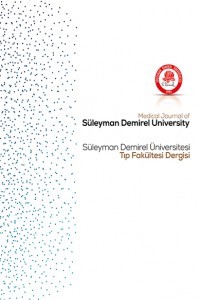Klinik Öncesi Tıp Öğrencilerine Kanıta Dayalı Tıp Eğitimi ve Özyeterlik Algılarının Değerlendirilmesi
Kanıta Dayalı Tıp, Mezuniyet Öncesi, Tıp Eğitimi, Klinik Öncesi Tıp Öğrencileri
Evidence-Based Medicine Course for Pre-Clinical Medical Students and Evaluation of Their Self-Efficacy Perceptions
___
- 1. Sackett DL, Rosenberg WMC, Gray JAM, Haynes RB, Richardson WS. Evidence based medicine: what it is and what it isn’t. BMJ [Internet]. 1996 Jan 13 [cited 2019 Feb 6];312(7023):71 LP – 72. Available from: http://www.bmj.com/content/312/7023/71.abstract
- 2. Guyatt G, Cairns J, Churchill D, Cook D, Haynes B, Hirsh J, et al. Evidence-Based Medicine. JAMA [Internet]. 1992 Nov 4 [cited 2019 Feb 6];268(17):2420. Available from: http://jama.jamanetwork.com/article.aspx?doi=10.1001/jama.1992.03490170092032
- 3. Straus SE, Sackett DL. Evidence-based medicine: how to practice and teach EBM. 2005;XVI, 299 s.
- 4. Yılmaz E, Çöl M. Kanıta Dayalı Tıp Evidence Based Medicine. J Clin Anal Med | 1 J Clin Anal Med [Internet]. 2014 [cited 2019 Feb 7];5(6):537–79. Available from: http://www.jcam.com.tr/files/KATD-1847.pdf
- 5. Finkel ML, Brown H-A, Gerber LM, Supino PG. Teaching evidence-based medicine to medical students. Med Teach [Internet]. 2003 Jan 3 [cited 2019 Feb 6];25(2):202–4. Available from: http://www.tandfonline.com/doi/full/10.1080/0142159031000092634
- 6. Kahveci R, Özyiğit F. Kanıta Dayalı Tıp Beceri Edindirme Yöntemleri [Training Methods to Improve Evidence-Based Medicine Skills]. TAF Prev Med Bull. 2010;9(3):245–54.
- 7. Saygılı M, Kaya S, Sonğur C, Özer Ö, Üniversitesi K, Bilimleri S, et al. Aile hekimlerinin kanıta dayalı tıp uygulamalarını kullanım durumları ve bilgi arama davranışları Family physician’s evidence based medicine applications and information searching behaviours. SDÜ Sağlık Bilim Enstitüsü Derg [Internet]. 2013 [cited 2019 Feb 7];4(13):104–10. Available from: http://dergipark.gov.tr/download/article-file/196025
- 8. Manisa Celal Bayar Üniversitesi Tıp Fakültesi Eğitim Öğretim Rehberi [Internet]. [cited 2019 Feb 7]. Available from: http://tip.mcbu.edu.tr/mezuniyet-oncesi-egitim/egitim-ogretim-rehberi.156.tr.html
- 9. Krathwohl DR. A revision of bloom’s taxonomy: An overview [Internet]. Vol. 41, Theory into Practice. 2002 [cited 2020 Jan 11]. p. 212–8. Available from: https://www.tandfonline.com/action/journalInformation?journalCode=htip20
- 10. Shrauger JS, Osberg TM. The relative accuracy of self-predictions and judgments by others in psychological assessment. Psychol Bull. 1981;90(2):322. 11. Dochy FJRC, McDowell L. Introduction: Assessment as a Tool for Learning. Stud Educ Eval. 1997;23(4):279–98.
- 12. Bennett KJ, Sackett DL, Haynes RB, Neufeld VR, Tugwell P, Roberts R. A Controlled Trial of Teaching Critical Appraisal of the Clinical Literature to Medical Students. JAMA J Am Med Assoc. 1987 May 8;257(18):2451–4.
- 13. Ilic D, Maloney S. Methods of teaching medical trainees evidence-based medicine: a systematic review. Med Educ [Internet]. 2014 Feb 1 [cited 2019 Feb 6];48(2):124–35. Available from: http://doi.wiley.com/10.1111/medu.12288
- 14. Acharya Y, Raghavendra Rao M V, Arja S. Evidence-based medicine in pre-clinical years: a study of early introduction and usefulness. J Adv Med Educ Prof [Internet]. 2017;5(3):95–100. Available from: http://www.ncbi.nlm.nih.gov/pubmed/28761882%0Ahttp://www.pubmedcentral.nih.gov/articlerender.fcgi?artid=PMC5522909
- 15. Ghali WA, Saitz R, Eskew AH, Gupta M, Quan H, Hershman WY. Successful teaching in evidence-based medicine. Med Educ [Internet]. 2000 Jan [cited 2020 Jan 31];34(1):18–22. Available from: http://doi.wiley.com/10.1046/j.1365-2923.2000.00402.x
- 16. Schilling K, Wiecha J, Polineni D, Khalil S. An Interactive Web-based Curriculum on Evidence-based Medicine: Design and Effectiveness [Internet]. 2006 [cited 2020 Jan 31]. Available from: www.guideline.
- 17. Davis J, Crabb S, Rogers E, Zamora J, Khan K, Khalid Khan &. Medical Teacher Computer-based teaching is as good as face to face lecture-based teaching of evidence based medicine: a randomized controlled trial Computer-based teaching is as good as face to face lecture-based teaching of evidence based medicine: a randomized controlled trial. 2008 [cited 2020 Jan 31];30:302–7. Available from: https://doi.org/10.1080/01421590701784349
- 18. West CP, Jaeger TM, McDonald FS. Extended evaluation of a longitudinal medical school evidence-based medicine curriculum. J Gen Intern Med. 2011;26(6):611–5. 19. Nieman LZ, Cheng ; Lee, Foxhall LE. Teaching First-year Medical Students to Apply Evidence-based Practices to Patient Care. 2009.
- 20. Srinivasan M, Weiner M, Breitfeld PP, Brahmi F, Dickerson KL, Weiner G. Early Introduction of an Evidence-based Medicine Course to. Intern Med [Internet]. 2000 [cited 2019 Jan 11];(September):58–65. Available from: https://link.springer.com/content/pdf/10.1046%2Fj.1525-1497.2002.10121.x.pdf
- 21. Sastre EA, Denny JC, McCoy JA, McCoy AB, Spickard A. Teaching evidence-based medicine: Impact on students’ literature use and inpatient clinical documentation. Med Teach [Internet]. 2011 Jun [cited 2020 Feb 21];33(6):e306-12. Available from: http://www.ncbi.nlm.nih.gov/pubmed/21609166
- 22. İlhan MN, Maral I, Güney Z, Haznedaroğlu Ş, Çakır N, Tunaoğlu FS, et al. GAZİ ÜNİVERSİTESİ TIP FAKÜLTESİNDE KANITA DAYALI TIP EĞİTİMİ: İLK YIL DENEYİMİ* Evidence Based Medicine Education in Gazi University School of Medicine: First Year Experience.
- ISSN: 1300-7416
- Yayın Aralığı: Yılda 4 Sayı
- Başlangıç: 2015
- Yayıncı: Süleyman Demirel Üniversitesi
SCHWANNOMA İLE KARIŞAN MALİGN SOLİTER FİBRÖZ TÜMÖR-BİR OLGU SUNUMU
Süleyman Emre AKIN, Hıdır ESME, Ferdane Melike DURAN
Halil İbrahim ÇIKRIKLAR, Vahide Aslihan DURAK, Şahin ASLAN, Deniz SIĞIRLI, Erol ARMAĞAN
İzole medial subtalar çıkık: Olgu sunumu ve güncel literatürün gözden geçirilmesi
Emrah Kovalak, İbrahim Yıldız, Tolga Atay, Salih Korkmaz, Hüseyin Yorgancıgil, Hasan Basri Pınar
Çisel YAZGAN, Hakan ERTÜRK, Ayşenaz TAŞKIN
Isparta’daki Okul Çocuklarında Hipertansiyon Prevalansı ve Risk Faktörlerinin Araştırılması
İsmail SARIKAN, Kurtuluş ÖNGEL
Emine Elif ÖZKAN, Zümrüt Arda KAYMAK, İbrahim ÇOBANBAŞ, Şehnaz EVRİMLER, Mustafa KAYAN
Isparta İlinde Adli Geriatrik Ölümler: 2010 – 2018 Verileri
Abdulkadir YILDIZ, Erdinç ÇAYLI, Özgür Riza KAYĞUSUZ, Gülsüm Hülya KARA
Pınar KOŞAR, Muhammet Yusuf TEPEBAŞI, Emine Güçhan ALANOĞLU
Optik Strut Morfometrisi: Radyoanatomik Çalışma
Hakan ÖZALP, Barış TEN, Orhan BEGER, Pourya TAGHİPOUR, Salim ÇAKIR, Deniz Ladin ÖZDEMİR, Fatma MÜDÜROĞLU, Vural HAMZAOĞLU, Ahmet DAĞTEKİN, Derya Ümit TALAS
Hipertansiyon Hastalarında Nötrofil Lenfosit Oranının Regülasyon Belirteci Olarak Kullanılması
